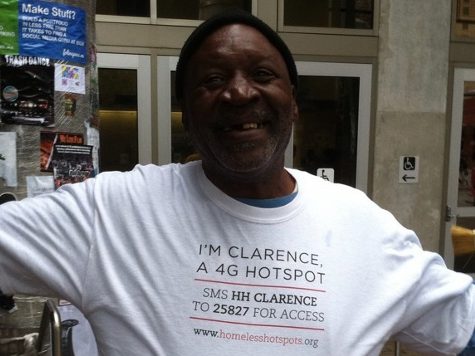
Talk about an apt illustration of the message of Occupy Wall Street; at SXSW in Austin, rich collegiate hipsters are powering their fancy smartphones literally off the backs of the poor. Ad agency BBH’s program “Homeless Hotspots,” which is not associated with the music festival, aims to speed up mobile broadband connections for attendees by placing 13 occupants of a local homeless shelter around the city, equipped with 4G hotspots which can be accessed for a donation.
But, joking aside, is this an example of how capitalism exploits through the poor through undignified servitude, or is it emblematic of how entrepreneurial service elevates the economic standing of the poor?
BBH claims “Homeless Hotspots” is based on the model of street newspapers:
One particular aspect we find intriguing is Street Newspapers, which are print publications created and sold by homeless populations as a form of entrepreneurial employment. The model has proven successful enough to be adopted in cities spanning 30 countries. The issue however, is that like any print publication, these newspapers are under duress from the proliferation of digital media. How often do you see someone “buy” a paper, only to let the homeless individual keep it? This not only prevents the paper from serving as a tool for the individual to avoid begging, but it proves how little value people actually place on the publication itself. Yet the model isn’t inherently broken. It’s simply the output that’s archaic in the smartphone age.
So we decided to modernize it.
The participants in the program keep all of the money given to them by their customers–money that they otherwise would never see. And, as they don’t purchase and maintain the equipment themselves, they are guaranteed nothing but profit. The agency is not making any money from the service.
A common theme of the backlash against the project is that BBH is somehow debasing the homeless; the ad agency just wants to “use underprivileged, marginalized people” as “utilities” and “pieces of equipment,” several commenters say. Yet the alternative is… what? Simply begging? That’s more dignified? These sanctimonious cries carry the subtext: it would be better for them to panhandle.
This is a case which exemplifies capitalism’s mutually beneficial nature. All parties in the exchange–the mobile broadband users, the homeless, and the ad agency–are objectively better off. The festival goers have better Internet speeds. The homeless have something to do and are pocketing money. The ad agency, despite the backlash, has increased its profile. And still, people are begrudging more money and more economic freedom for the homeless because they perceive some disparity between that benefit and the benefit given to the other parties.
This would be exploitation if the participants were forced into the work. This would be exploitation if it weren’t an essentially free service–if the agency charged for access, took a cut, and didn’t pay a wage to the hotspot operators. But it’s all voluntary–providing the service, caretaking the hotspots, using the service, donating to the caretakers. And yet there are those who regard this rare case of everyone agreeing with the same horror they do the Chinese sweat shop labor that goes into the manufacture of their iPads.
The only exploitation going here is from the people using the homeless to beat their chests about how they know better than the poor.
Image Source: A Hardly Normal View

COMMENTS
Please let us know if you're having issues with commenting.